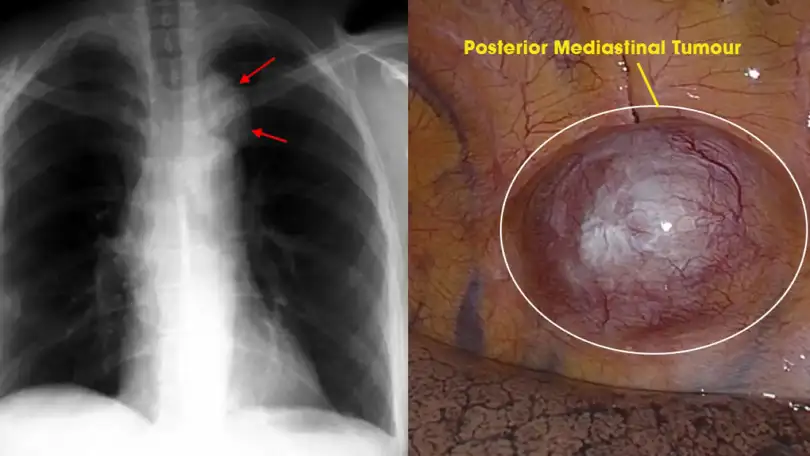

MBBS (AIIMS), MS (Surgery, AIIMS), MNAMS, FACS (USA), FICS (USA), FUICC
Thu, 25 Jan 2024

Posterior mediastinal tumours are rare growths that develop within the posterior mediastinum, hence the name. This is the location between the spine and the posterior surface of the heart.
In most cases, these tumour outgrowths are benign, but they can also be malignant (cancerous). They also have the potential to arise from varying tissues, including the nerves, connective tissues, lymph nodes, etc.
This article will explore everything related to posterior mediastinal tumours, their causes, symptoms, diagnosis and favourable treatment options. For more information you can consult Dr Arvind Kumar, one of the best chest surgeons in India.
Posterior Mediastinal tumors are benign or cancerous growths that form in the back area of the chest that separates the lungs. This area, called the posterior mediastinum, is surrounded by the spine in back and the lungs on each side. These tumors can develop at any age although 30-50 years is the commonest affected age group.
The exact cause behind this condition is unclear, but there are a few contributing factors that might contribute to their development, including:
Every patient’s risk factor and causes are subjective, so a thorough evaluation and diagnosis is mandatory.
The symptoms of posterior mediastinal tumours will vary depending on the type of tumour (benign or malignant) and the severity.
Some of the most vital symptoms include:
Depending on these symptoms, one must prioritise a quick and comprehensive diagnosis.
Sometimes, they may cause cough, shortness of breath, chest pain or unexplained weight loss. Many a times, they produce no symptom and are incidentally detected on a chest X-ray done for some other reason including, routine medical check-up.
The diagnosis of a posterior mediastinal tumour is a multi-step process. With leading specialists like Dr. Arvind Kumar, you can rest easy knowing you are in the right hands. The diagnosis is confirmed by a CT scan or X-Ray of the chest.
Following is a breakdown of the diagnosis process:
This is the initial consultation where the specialist starts by asking the patient about their symptoms and performing a physical examination to look for issues. This stage also involves discussing in detail about the patient’s medical history.
Depending on the initial evaluation, the specialists will prescribe further tests to determine the root cause of the symptoms.
Some of the most common imaging tests that are prescribed for the diagnosis of posterior mediastinal tumours include:
Blood tests are also prescribed to assess the patient’s general health and rule out any possibilities of underlying complications or infections in the patient.
This is typically the last test in the diagnosis process. If the imaging tests return with a suspicious report that indicates a tumour growth, the specialist will prescribe a biopsy to confirm if the tumour is benign or malignant and decide the ideal treatment route.
Treatment choice for a posterior mediastinal tumour depends on several factors, including the type of tumour, its size, location, and whether it is benign or malignant.
We will discuss the two most commonly used surgical treatment options for this condition.
This minimally invasive thoracic surgery enables surgeons to access and remove posterior mediastinal tumours through small incisions using a camera and specialised instruments.
Some of the advantages of VATS include:
This advanced surgical technique combines the precision of traditional open surgery with the minimally invasive benefits of VATS. It employs a surgical robot that assists the surgeon in performing the procedure.
Using the robots enhanced dexterity and 3D visualisation, the surgeon meticulously removes the tumour, ensuring thorough excision while preserving nearby structures.
Some of the advantages of robotic-assisted surgery include:
Complete surgical removal is the treatment. The surgery for posterior mediastinal tumour can be done best by VATS/Robotic method which has been our speciality for over a decade. Once diagnosed, they must be removed as early as possible, as they continue to grow. Key-hole (VATS) or Robotic method has been our preference for better patient outcome.
The surgery for posterior mediastinal tumour can be done best by VATS/Robotic method which has been our speciality for over a decade.
Posterior mediastinal tumours, though rare, can significantly impact a patients health and quality of life. If you are experiencing off-putting symptoms affecting your day-to-day life, you must consider medical help for the same.
Dr Arvind Kumar, a leading chest surgeon in India with 40+ years of experience, is someone who can help you restore your quality of life and offer hope for a brighter future. For more details related to the treatment or consultations, contact us directly.
Copyright @ (Prof.) Dr. Arvind Kumar. All Rights Reserved / Thoracic Surgical Oncologis
License Number: U.P State Medical Council (India) No. 27637
